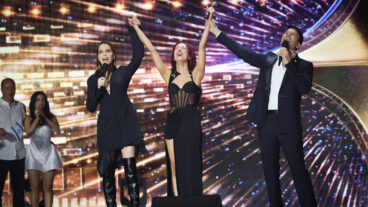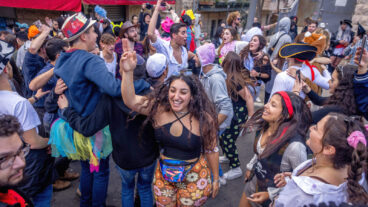Los Angeles members of Café Europa Sophie Hamburger and Cyla Tenenbaum visit Yad Vashem’s Valley of the Communities last week. (Photo: Sasson Tiram)For three years, the members of the Holocaust survivors group Café Europa – Los Angeles and Café Europa – Tel Aviv have been getting to know each other via regular video conferencing. At the conclusion of the first such meeting, Susie Fohrer-Dehry, director of Jewish Family services in Los Angeles who helps run the Los Angeles branch, joked that perhaps members of both cafes would meet in Israel some day.
Last week the historic meeting actually took place when fourteen survivors from LA flew to Israel to spend a week, centered around the commemoration of Holocaust Martyrs’ and Heroes’ Remembrance Day. Late last week, a busload of survivors from both cities took an emotional trip to Massada and the Dead Sea together, the first in a week of planned activities.
Café Europa gets its name from a café in Stockholm, Sweden, where, directly after the World War II, Holocaust survivors came to look for their lost relatives, and today’s Café Europa has also united several members who came from the same town or were in the same barracks. In fact last week at Massada, male survivors that live in LA and Tel Aviv, 9,000 miles apart, recognized each other as having been to high school together in Eastern Europe.
“Café Europa was established in Los Angeles in 1988, after psychologist Flo Kinzler returned from a visit to Sweden. She was very impressed after meeting a group of survivors who met weekly for fun and support, and Café Europa is based on that model,” says Fohrer-Dehry. “We have weekly activities, we commemorate Yom Hashoah (Holocaust Remembrance Day) together, and celebrate the Jewish holidays.”
“It is a place where survivors can be themselves, a home away from home,” adds an elegant elderly lady named Lida Budgor who is the chairperson of Café Europa, Los Angeles. Her name tag reads “Lidia Budgor, Lodz,” so that the Israelis she will meet will immediately be able to identify her and approach her if they recognize either the name or the provenance.
The connection with Israel has injected new life into Café Europa, Los Angeles. The first Israeli branch was inaugurated in November 2001 after several Israeli social workers paid a visit to the Los Angeles community to learn more about their services. They were very excited by the concept of the Café and lost no time in starting their own, to serve the 30,000 survivors who live in Tel Aviv. Café Europa in Tel Aviv now has two branches – one with 60 regulars and the other with 80, although there are a total of 300 official members.
Mirta Cohen, the leader of one of the two Tel Aviv groups, explains that when survivors ask each other “where are you from?” the answers will be either the name of the camp they were liberated from, or the town where they lived before the war. “The beauty of encounters at the Café is that there is no need to explain, they all understand each other,” she says.
Open once a week for three hours, Café Europa is a social meeting place where people who have been through the horrors of hell on earth, can go and drink coffee, be entertained, share stories of the past and of the present, and engage in a number of entertaining activities which include dancing. But its influence extends outside of the Cafe walls.
“The members of the Café are not all exactly ‘friends’,” explains Bella Kaczor, from Chernohlava and Carlsbad. “I mean some of us will meet outside of the Café. But we are really each other’s family, if someone is sick we all call them, we worry about each other.”
In the same vein, Budgor recalls a friend who was very ill and in dire financial circumstances. She convinced him to accept assistance that saved his life. Without Café Europa who knows what would have happened. Staff from the café also pay home visits on a regular basis to those unable to attend the functions.
As they sat side by side on a tour bus last week on the way to Massada, the Los Angeles contingent sang along while a member of the Israeli group – Yehuda Goldstein from Hungary, who came over on the Exodus at the age of seven, having lost his entire family – played the mouth accordion. Renditions ranged from “Yankee Doodle” to “Yerushalayim Shel Zahav.” The eeriest and yet the most hopeful of the songs was the nursery rhyme highlighted in the movie, Schindler’s List, that is played while the ghetto is being liquidated.
The excitement increased as Massada came into view, and once the entire group was traveling upwards in the large, glass encased cable car, overlooking the desert, genuine laughter and happiness filled the space.
Commenting on that precious scene, Fohrer-Dehry calls it a defining moment of Café Europa. “Café Europa is about life,” she says adding “Cafe Europa Tel Aviv gives LA group the sense of belonging. Israel is the home that they lived for. They see it real now. To be here now, with their counterparts, is to be able to touch base and feel part of something bigger.”
As they walk among the ruins of Massada, these tourists look like any other group. “They look so frail, so elderly, so cute,” says Los Angeles social worker Paula Fern. “But the stories they have to tell are about anything but frailty. They are inspirational,” she says, admitting that her work with Café Europa has taken over her life. “It is my passion,” she says.
Cohen’s attitude echoes Fern’s words. “My Café Europa is based on kisses, hugs and physical contact.
“For some of our members that is the only love and physical contact they get throughout their week. We are a social program but it is the very dedicated work of our social workers that makes it successful. They can step in at any moment and take care of emotional needs that arise.” The staff keeps the mood happy and up-tempo at the meetings.
The survivors all make a determined effort to do the walking and climbing, at Massada, even though many of them are in their 80s.
“I can’t believe I was in Auschwitz and now I am here,” says Kaczor, as she treads an upward path.
Rena Drexler has been to Israel six times, including her present visit. “It has changed a lot for the better,” she says. “It opens up your heart to be here, you keep crying, you release tears and your heart gets better.”
Drexler has family in the Israeli army. “It is wonderful to see the Jewish State; everything is Jewish. We were liberated on May 8 from Auschwitz. I never thought we would see Eretz Israel. It is very emotional to see the Jewish military.”
Despite the long flight she is happy she came, “when you come here and you step down off the plane, everything is Jewish and nobody can tell you who you are.”
Drexler, who has been lecturing on the Holocaust since 1967, is excited because the day before, Café Europa met with a group of Ethiopian immigrants who had only just finished learning about the Holocaust. This meeting gave the survivors the opportunity to do what they do best, to pass on a piece of living history.
“It is a long way from Lodz to Tel Aviv,” says Budgor, addressing the group at lunch before setting off to enjoy the minerals at the Dead Sea. “This trip is very special. We are together again, brothers and sisters. We are happy to be here. You are a tough lot. Finally it was realized who we were, what we can do together, what a legacy we can leave. We have brought up children who can contribute to the world; doctors, lawyers, generals.”











